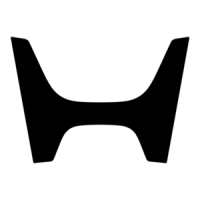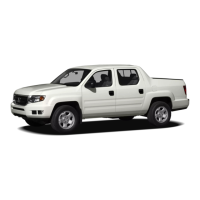This spreads the forces of a crash
over the strongest bones in your
upper body.
If the seat belt touches or crosses
your neck, or if it crosses your arm
instead of your shoulder, you need to
adjust the seat belt anchor height.
Position the lap part of the belt as
low as possible across your hips,
then pull up on the shoulder part of
the belt so the lap part fits snugly.
This lets your strong pelvic bones
take the force of a crash and reduces
the chance of internal injuries.
If necessary, pull up on the belt again
to remove any slack, then check that
the belt rests across the center of
your chest and over your shoulder.
Insert the latch plate into the buckle,
then tug on the belt to make sure the
belt is securely latched. Check that
the belt is not twisted, because a
twisted belt can cause serious
injuries in a crash.
The seat belt in the center position
of the back seat can be unlatched
and retracted to allow the back seat
to be folded up or down. This seat
belt should be latched whenever the
seat-back is in an upright position.
See page for how to unlatch and
relatch the seat belt.
109
CONTINUED
Fasten and Position the Seat
Belts
5.
Protecting Adults and Teens
Driver and Passenger Safety
15
Improperly positioning the seat
belts can cause serious injury
or death in a crash.
Make sure all seat belts are
properly positioned before
driving.
09/07/16 17:46:11 31SWA630_020

